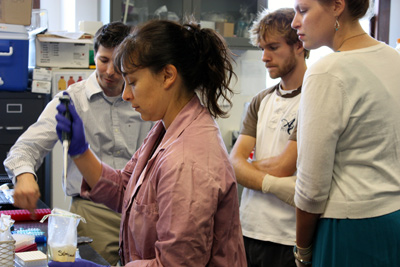More than just tape: 3M partners with food scientist
By Stacey Shackford

When Martin Wiedmann, professor of food science, tests meat samples suspected to be tainted with salmonella, he may be able to do so even faster, thanks to a new high-tech tool recently added to his arsenal.
The food scientist has partnered with 3M to test a new molecular diagnostic system that could cut pathogen detection times from 72 hours to just 18 hours.
"Rapid and easy detection of food-borne pathogens is a continuing challenge, and we are very excited to test this product and see if it can make the process quicker," Wiedmann said.
3M, a Minnesota-based company known for its innovation in many marketplaces, has a successful Health Care Division focused on food safety. For decades, 3M Food Safety has been a leader in producing 3M Petrifilm Plates, microbial indicator count plates. 3M is expanding its scope into developing the next generation of scientific technology, and the new device -- a sleek, robust unit about the size of a laptop -- is designed to be easy enough to use outside the lab, by industry and testing facilities.
Using this new device, prepared samples are loaded and quickly assessed. The resulting data is then available for immediate analysis and documentation via a direct computer connection.

Wiedmann said he will use the device alongside more traditional methods while he tests samples as part of several of his ongoing research projects, which trace how pathogens like salmonella and Listeria are transferred throughout the food chain.
The data he collects not only will support the range of uses of 3M's new instrument, but also add to their database of pathogen reactions, which will be a valuable resource to the machine's developers, as well as future customers. Many of the pathogens Wiedmann tests in his laboratory are not available anywhere else.
3M is also set to gain valuable feedback on how its product performs under rigorous testing in academic lab conditions, and how it might be improved for its future customers based on user experiences.
Robert Koeritzer, technology manager in 3M's Food Safety Department, said his company was drawn to Cornell because of Wiedmann's prominence in the field of food safety and the College of Agriculture and Life Sciences' connections within the broader food industry.
"Cornell has great relationships with many of our customers, so they understand the problems they face and can help us understand how we can develop innovative solutions," he said. "For us to do a study with a recognized university like Cornell gives us credibility with our customers and the industry."
Koeritzer said he hopes the project will be the first of many collaborations.
"Ultimately, we are looking to work with Cornell on a long-term basis to develop future technologies that will help our customers succeed," he said.
Stacey Shackford is a staff writer at the College of Agriculture and Life Sciences.
Media Contact
Get Cornell news delivered right to your inbox.
Subscribe